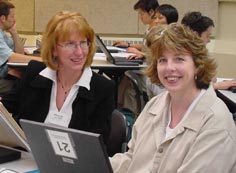 |
|
||||

|
Example 5: The European Union for French Learners at the Novice Level by Pam Wesely Teacher Reflection Working on the IPA assignment has been an enlightening experience. I really have enjoyed figuring out the process-oriented way of creating an assessment. My biggest epiphany (just a few days ago!) occurred when I realized that this was really not a lesson plan at all. It was an assessment plan. A summative assessment plan, no less! Getting that feedback off of my draft work really made me realize that I was in a new world of assessment. I think that I originally imagined the IPA as a new type of unit, wherein I was trying to adapt a specific sequence of tasks to my already-established means of teaching. I attribute this in part to the video that we saw in class, where the unit prior to the IPA was deemphasized. This original misconception had led to some considerable frustration on my part about the nature of the IPA, but since I have learned its place as a summative assessment, I like it more. My earliest challenge on this project was to find a way to use the idea of the IPA (such as I understood it at the time) with my young novice students in a traditional foreign language classroom. Getting the text for the Interpretive Task was our first assignment in the creation of our IPAs, and I selected a few nursery rhymes about colors and animals, topics which fit nicely with my fifth-grade curriculum. However, I soon learned that I needed to think beyond the vocabulary-based communicative lessons that I often taught to my novice students. These lessons are often based on vocabulary acquisition, and for a content-based (or theme-based, as the IPA Manual authors seem to characterize it) assessment like the IPA, this was simply not appropriate. Therefore, I reconsidered my original choice of fables and looked for a text that had more content to it. I found one about the European Union and went from there. After I found my text, the rest of the IPA seemed to fall into place, given that I was operating under the faulty assumption that it was an instructive unit rather than an assessment unit. I wrote the draft under that misconception. Luckily, after getting feedback, it was not too difficult to adapt the draft to the final product as a summative assessment of a unit rather than an instructive unit about the European Union. It is clear now, however, that I need to create a unit about the European Union so that I can do my IPA with my students! More difficult was the rewriting of my Interpersonal Task to be more responsive to the novice level of my learners. My draft Interpersonal Task was too complex and open-ended to be appropriate to their level. Instead, in my final draft, I chose to build off of a common class game of 20 questions (usually based on a picture) and to make the Interpersonal Task one where only the questioner was assessed, although they were still required to interact with the responder. This was a change that I had to ponder for quite a while! My final question to myself is, can the Integrated Performance
Assessment be used effectively in a novice-low traditional FL classroom?
I would like to try my IPA and find out. Clearly, the big sticking point
is not the Interpretive Task, and not even in most cases the Presentational
Task, but the Interpersonal Task. I think that the key to its success
is to build off of activities and tasks that are already done in the novice-low
classroom. I found a lot more ideas when I worked from what I already
did in my room with my learners. Repeating types of activities that are
already done regularly in the classroom gives the students a sense of
mastery even when the implications and evaluation of the task have changed
significantly.
Navigation: Follow the IPA process or go directly to the section that is of most interest to you by clicking on the appropriate category
|
||||
